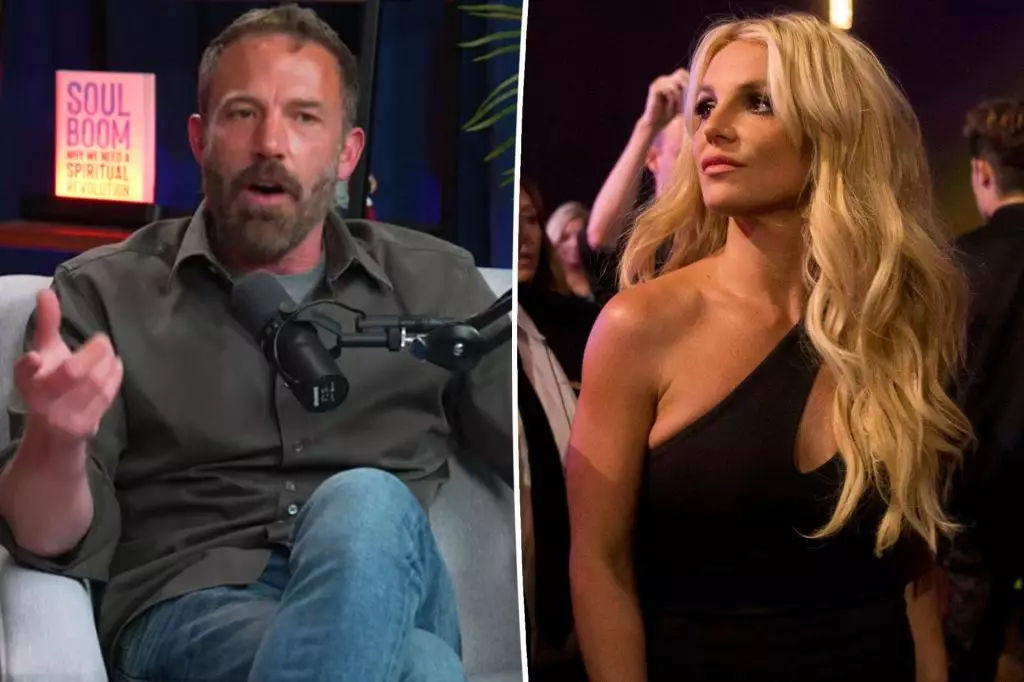In the whirlwind of Hollywood, celebrities often find themselves trapped in a world where their private lives are relentlessly scrutinized by the public and media. Recently, Ben Affleck expressed his sentiments regarding the extreme pressures faced by pop icon Britney Spears during a tumultuous period in her life. Speaking on the podcast “This Past Weekend With Theo Von,” Affleck shed light on the psychological toll that constant paparazzi harassment can impose on individuals who are already navigating their personal battles. His reflections bring to the forefront a discussion about empathy and the moral implications of fame—a dialogue that is essential as we attempt to understand the dynamics of celebrity culture.
While acknowledging his past empathy for Spears, Affleck’s observations highlight a larger societal issue—what he describes as “collective cruelty.” This phrase encapsulates the idea that the collective behavior of society can morph into a kind of mob mentality, disregarding the emotional struggles of those in the spotlight. The notion that individuals can become unwitting participants in the downfall of another person raises ethical questions about the media’s role in shaping narratives around celebrity lives. Affleck’s critique serves as a powerful reminder that compassion should prevail over sensationalism.
A Glimpse into Britney’s Struggles
The timing of Affleck’s comments is poignant. Spears faced intense scrutiny during 2007, marked by her infamous head-shaving incident. Many of her actions during this period were responses to extreme pressure—pressures that were compounded by the aggressive tactics of paparazzi and the public’s insatiable curiosity. The media often portrays celebrities as larger-than-life figures, neglecting their humanity in pursuit of dramatic stories. Affleck’s retrospective acknowledgment of Spears’ situation underscores the need to consider the multifaceted nature of mental health battles, particularly as they relate to the visible and invisible struggles that public figures endure.
Furthermore, Affleck’s emphasis on the consequences of relentless harassment raises a crucial point about personal agency. When a celebrity is hounded by cameras and invasive questions, it strips away their sense of control over their own narratives. Affleck brilliantly articulates this dehumanizing experience, noting that the photographs taken during confrontations—moments of visible annoyance or distress—do not represent the complete reality. They are instead fragments of a larger, more complex story that often goes untold amidst the noise of the media frenzy.
The Collective Responsibility of Society
What Affleck highlights is not merely an isolated incident of celebrity distress but rather a moral imperative for society as a whole. The audience, media, and industry insiders play a part in allowing this cycle of cruelty to perpetuate. As consumers of celebrity content, our engagement shapes the industry’s practices. Thus, it is essential for us to consider our role and demand a shift towards a more compassionate approach to sharing celebrity lives.
This call for empathy resonates beyond the walls of Hollywood. It invites introspection into the ways we engage with public life—from the videos we consume online to the gossip we share with friends. Acceptance of human vulnerability should transcend the realm of entertainment; it must inform our interactions with everyone around us. The more we recognize that each person, celebrity or not, grapples with their own battles, the more we can advocate for a society grounded in kindness and understanding.
Reflections on Fame and Its Discontents
Affleck’s insights concerning his own experience with Spears, especially regarding an alleged past interaction during a party, reveal yet another layer to this unfolding narrative. When queried about a supposed make-out session, he deflected as any private individual might, highlighting an important aspect of celebrity culture: the disassociation between the public persona and private life. This dissonance often leads to misunderstandings and assumptions that contribute to the collective narrative around celebrities.
Overall, Ben Affleck’s reflections compel us to re-evaluate our perceptions of fame and what it means for those living within its constraints. They urge us to foster an environment where empathy supersedes scrutiny and where understanding prevails over exploitation. In recognizing the shared humanity of public figures, we can cultivate a less dramatic, more respectful society—one that values individuals beyond the confines of their celebrity status. Through this lens, we can work towards breaking the cycle of collective cruelty highlighted by Affleck, paving the way for a more humane future in a media-saturated world.

